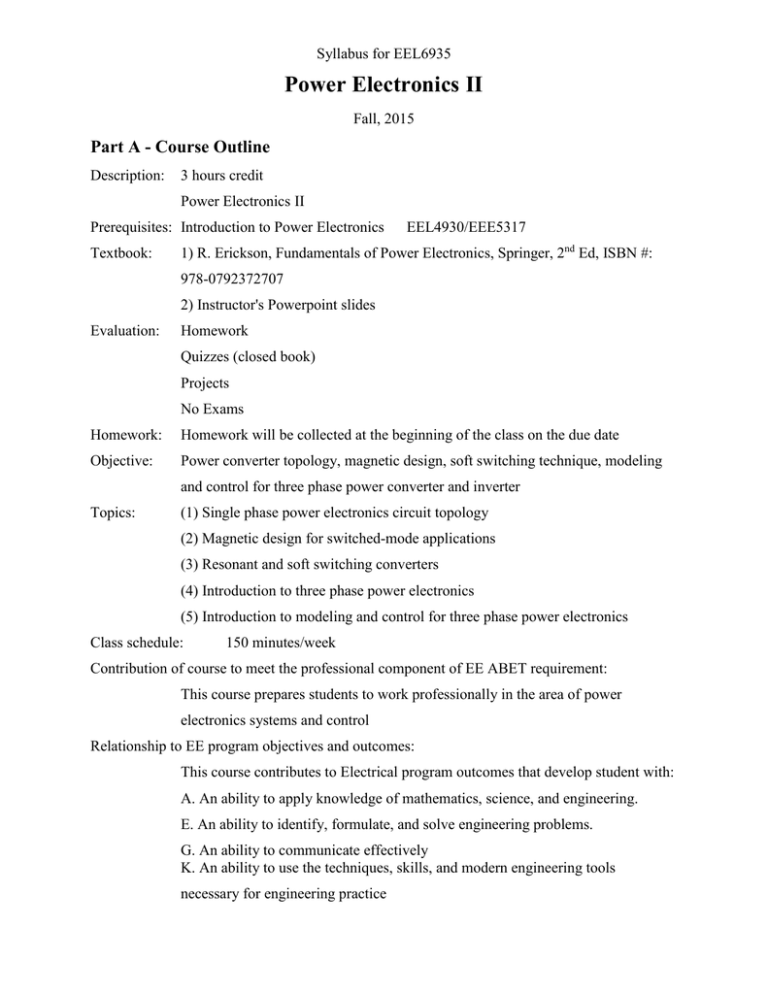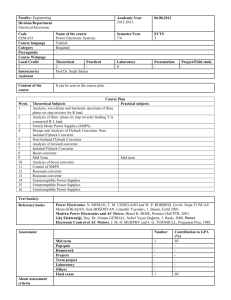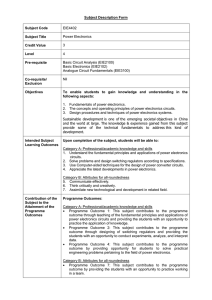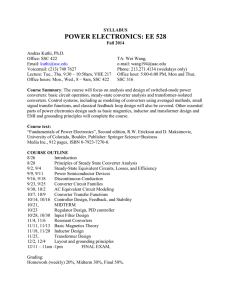Fall 2015 - Associate Chair Home
advertisement

Syllabus for EEL6935 Power Electronics II Fall, 2015 Part A - Course Outline Description: 3 hours credit Power Electronics II Prerequisites: Introduction to Power Electronics Textbook: EEL4930/EEE5317 1) R. Erickson, Fundamentals of Power Electronics, Springer, 2nd Ed, ISBN #: 978-0792372707 2) Instructor's Powerpoint slides Evaluation: Homework Quizzes (closed book) Projects No Exams Homework: Homework will be collected at the beginning of the class on the due date Objective: Power converter topology, magnetic design, soft switching technique, modeling and control for three phase power converter and inverter Topics: (1) Single phase power electronics circuit topology (2) Magnetic design for switched-mode applications (3) Resonant and soft switching converters (4) Introduction to three phase power electronics (5) Introduction to modeling and control for three phase power electronics Class schedule: 150 minutes/week Contribution of course to meet the professional component of EE ABET requirement: This course prepares students to work professionally in the area of power electronics systems and control Relationship to EE program objectives and outcomes: This course contributes to Electrical program outcomes that develop student with: A. An ability to apply knowledge of mathematics, science, and engineering. E. An ability to identify, formulate, and solve engineering problems. G. An ability to communicate effectively K. An ability to use the techniques, skills, and modern engineering tools necessary for engineering practice Performance Criteria: 1. Students will demonstrate the ability to design and model single phase power electronics systems for different circuit topologies. 2. Students will demonstrate the ability to design and model simple three phase power converters / inverters for different applications. Course Content: Engineering Science 50% Engineering Design 50% Relationship to Other Courses: This is a very important required upper-division course for electrical engineers in all power electronics related areas. Part B – General Course Information and Policies Instructor: Dr. Shuo Wang Office: NEB 533 Phone: 352-392-4691 Email: shuo.wang@ece.ufl.edu Classroom: CHE0316 Office Hours: 9:30AM-11:30AM, every Monday or by appointment Grading: 20% Homework 10% Quizzes (closed book) 70% Projects Schedule: Tuesday 1:55-2:45PM, Thursday: 1:55-2:45PM, 3:00-3:50PM. Homework: Homework is due one week after it is assigned Homework will be collected at the beginning of the class on the due date Late homework will not be accepted If you missed quizzes, there is no makeup quizzes. Exams: As an upper level course, there is no exams Submission Requirement: a. Name, assignment number, date submitted on each page. b. Neat circuits with appropriate labels c. List of given values. d. List of starting conditions and equations. e. Development of equations that will yield final values. f. Numerical substitution into final equations. g. Final answer “Boxed” where appropriate. Course material: All course materials including syllabus, slides, homework, homework solutions, projects and your grades etc. will be posted in Canvas: https://lss.at.ufl.edu/ Please continuously check Canvas to get updated information. Preliminary Course Outline and Schedule Week 1 Section Topic Assignment (homework will be added later) 1.1 Power converter topology basics 8/27 has no classes 2 1.2 Full bridge and half bridge converters 9/1,3 1.3 Forward converter 3 1.4 Push-pull converter 9/8,10 1.5 Isolated boost converter 4 1.6 Flyback converter 9/22 and 9/24 have no classes 9/15,17 1.7 Boost Power Factor Correction converter 9/17: Homework 1 Due (6.1,6.5 and 6.9) 5 2.1 Magnetic design basics 9/29,10/1 2.2 Transformer modeling 6 2.3 Magnetic Core loss 08/25 10/6,8 Quiz 1 (week 1-4), 10/6 Winding AC loss 7 2.4 Magnetic devices 10/13,15 3.1 Inductor design 8 3.2 Design examples 10/20,22 4.1 Transformer design basics 9 4.2 Design examples 10/27,29 5.1 Resonant converter basics 10 5.2 Series resonant converter 11/3,5 5.3 Parallel resonant converter 11 6.1 Soft switching basics 11/10,12 6.2 Zero current switching 12 6.3 Zero voltage switching 11/17,19 7.1 Three phase power switch modeling 13 7.2 Vector representation of three phase 11/24, 12/1 7.3 variables Average model of voltage source inverter Quiz 2 (week 5-7), 10/22 Quiz 3 (week 7-8), 11/5 Quiz 4 (week 8-9), 11/12 Quiz 5 (week 9-10), 11/19 Quiz 6 (week 11-12), 12/1 14 7.4 Average model of current source inverter 12/3, 8 7.5 Small signal models for VSI and CSI 15 7.6 PWM modulation technique 7.7 Space vector modulation for VSI and CSI


